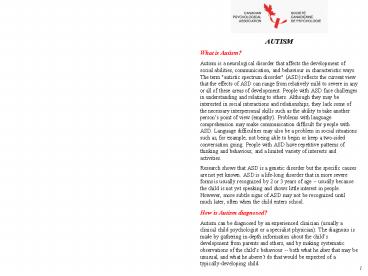AUTISM - PowerPoint PPT Presentation
1 / 2
Title:
AUTISM
Description:
... of social abilities, communication, and behaviour in characteristic ways. ... repetitive patterns of thinking and behaviour, and a limited variety of ... – PowerPoint PPT presentation
Number of Views:87
Avg rating:3.0/5.0
Title: AUTISM
1
AUTISM What is Autism? Autism is a
neurological disorder that affects the
development of social abilities, communication,
and behaviour in characteristic ways. The term
"autistic spectrum disorder" (ASD) reflects the
current view that the effects of ASD can range
from relatively mild to severe in any or all of
these areas of development. People with ASD face
challenges in understanding and relating to
others. Although they may be interested in social
interactions and relationships, they lack some of
the necessary interpersonal skills such as the
ability to take another persons point of view
(empathy). Problems with language comprehension
may make communication difficult for people with
ASD. Language difficulties may also be a problem
in social situations such as, for example, not
being able to begin or keep a two-sided
conversation going. People with ASD have
repetitive patterns of thinking and behaviour,
and a limited variety of interests and
activities. Research shows that ASD is a genetic
disorder but the specific causes are not yet
known. ASD is a life-long disorder that in more
severe forms is usually recognized by 2 or 3
years of age -- usually because the child is not
yet speaking and shows little interest in people.
However, more subtle signs of ASD may not be
recognized until much later, often when the child
enters school. How is Autism diagnosed? Autism
can be diagnosed by an experienced clinician
(usually a clinical child psychologist or a
specialist physician). The diagnosis is made by
gathering in-depth information about the childs
development from parents and others, and by
making systematic observations of the childs
behaviour -- both what he does that may be
unusual, and what he doesnt do that would be
expected of a typically-developing child.
1
2
With early recognition in young children and a
better understanding of both milder and more
severe forms in people of all ages, diagnosis of
ASD is becoming far more common. Recent estimates
suggest that 1 in every 200 children may be
affected. The impact of ASD can be overwhelming
on families, and the health, education and
community services that support them. What do
we do about Autism? Can Psychology
help? Nonetheless, outcomes for many people with
ASD are more positive than in past decades.
Advances in psychological research have improved
our understanding of the fundamental challenges
faced by people with autism, and have contributed
to improve methods of recognizing, assessing, and
treating ASD. Psychological assessment of
childrens ability profiles areas of relative
strength and weakness can guide the development
of appropriate programs for children with ASD,
and treatments based on psychological principles
are at the leading edge of autism
intervention. Evidence shows that early,
intensive interventions based on the teaching
principles of Applied Behaviour Analysis (ABA)
help children with ASD as part of a
comprehensive, individualized treatment program.
Key areas for intervention include social skills,
communication, daily living skills, academics,
self-management or coping skills, and family
support. A variety of psychological interventions
may be integrated with ABA approaches to meet an
individual childs needs. These include
incidental teaching (using teaching opportunities
that naturally arise every day in the home and
community) and structured teaching, which
emphasizes organizing the persons environment
(schedules, materials and settings) to optimize
the individuals ability to learn and function.
Peer-mediated interventions in which other
children are taught effective ways to interact
with a child with ASD can promote more positive
social opportunities. For older and more able
individuals with ASD, modified cognitive-behaviour
al strategies in which behaviour is changed by
changing the way the person thinks, as well as
systematic relaxation therapies, can be used to
help manage the anxiety that is often associated
with social situations and the unpredictable
challenges of daily living.
- More information about autism and related
disorders can be found at - Autism Society Canada, www.autismsocietycanada.ca.
- Canadian Autism Intervention Research Network,
www.caimsite.com. - National Autistic Society (UK), www.nas.org.uk,
www.nas.uk. - National Institute of Mental Health (US) Autism
Page, www.nimh.nih.gov/publicat/autism.cfm. - Consultation with or referral to a registered
psychologist can help guide you as to the use of
these therapies. For a list of psychologists in
your area, please visit http//www.cpa.ca/cpasite/
showPage.asp?id3fr - This summary has been created for the Clinical
Section of the Canadian Psychological Association
by Isabel M. Smith, Ph.D. Dr. Smith is a
registered Clinical Psychologist, and an
Assistant Professor in the Departments of
Pediatrics and Psychology, Dalhousie University.
She conducts research and provides clinical
consultation and professional education at the
IWK Health Centre in Halifax NS. Her research and
clinical interests are focussed on children and
adolescents with developmental disabilities,
especially autistic spectrum disorders, and their
families.
3
2































